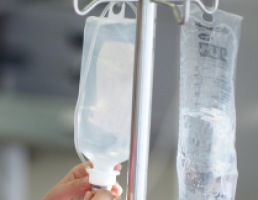
Commonly known as the breast cancer genes, the BRCA gene family plays a role in repairing damaged DNA.
Inherited mutations in the genes BRCA1 or BRCA2 raise the risk of developing breast, ovarian, prostate and other cancers.
Led by clinician-researchers at Beth Israel Deaconess Medical Center (BIDMC), a first-of-its-kind study provided new evidence about the optimal way to treat patients who carry BRCA mutations - also known as BRCA carriers - who have been diagnosed with breast cancer.
The new data come from the INFORM trial, the results of which appeared in the Journal of Clinical Oncology.
Designed to settle a question raised by previous studies, INFORM is the largest prospective randomised clinical trial to compare the efficacy of a platinum agent to a standard treatment regimen.
The INFORM trial was led by Nadine Tung, MD, Director of the Cancer Risk and Prevention Program and head of Breast Medical Oncology at Beth Israel Deaconess Medical Center (BIDMC).
"Previous studies reported that the platinum-based therapy cisplatin was effective in BRCA carriers with breast cancer," said Tung.
"Those findings left clinicians uncertain whether to use cisplatin - an unconventional drug for treating early stage breast cancer - or whether to use the same chemotherapy regimen used for other women with breast cancer. Prior to INFORM, no randomised prospective data existed comparing platinum to standard chemotherapy in this population of patients. Our study found that platinum-based therapy was actually no more effective than the standard first-line treatment."
Linked to five percent of breast cancer cases among the general population, BRCA mutations are responsible for a larger proportion of breast cancer in younger women, Jewish women, and those with a family history of breast cancer.
BRCA mutations are identified in 10 to 20 percent of women with the type of breast cancer known as triple negative breast cancer.
As part of the INFORM trial, Tung and colleagues at 13 medical centres recruited 117 patients newly-diagnosed with but not yet treated for breast cancer who were also known to carry one or both of the two known BRCA mutations.
Fifty-seven of these patients were treated with the standard first-line chemotherapy, doxorubicin combined with cyclophosphamide (AC), while 60 patients were treated with cisplatin.
All participants underwent mastectomy or lumpectomy, followed lymph node biopsy or dissection after completing their respective courses of treatment.
The results of the INFORM trial demonstrate that, while cisplatin is an active agent for treating breast cancer in BRCA carriers, it is not more effective than the standard chemotherapy regimen AC.
Tung and colleagues reported that among participants treated with cisplatin, the overall pathologic complete response rate - the disappearance of all cancer at surgery - was 18 percent compared with 26 percent with the AC regimen.
"We demonstrated that both regimens can be effective and treatment choice may need to incorporate an individual's other health concerns and anticipated side effects with each regimen," Tung said.
Further analysis of the data revealed that, among women with triple-negative breast cancer, pathologic complete response rates were 22 percent and 28 percent, respectively
Among patients with another subtype of breast cancer known as hormone receptor-positive breast cancer, response rates were six percent and 21 percent, respectively.
The number of patients with complete or near complete disappearance of cancer, termed Residual Cancer Burden 0 or 1, was also numerically but not statistically higher with AC than cisplatin, for all breast cancer subtypes.
"Given the previously reported impressive activity of platinum agents in BRCA-associated breast cancer, these results were surprising," Tung noted.
"The INFORM trial underscores the importance of confirming results from single arm trials with randomised trials."
Source: Beth Israel Deaconess Medical Center
Watch our interview with Dr Nadine Tung on the INFORM trial here.
The World Cancer Declaration recognises that to make major reductions in premature deaths, innovative education and training opportunities for healthcare workers in all disciplines of cancer control need to improve significantly.
ecancer plays a critical part in improving access to education for medical professionals.
Every day we help doctors, nurses, patients and their advocates to further their knowledge and improve the quality of care. Please make a donation to support our ongoing work.
Thank you for your support.